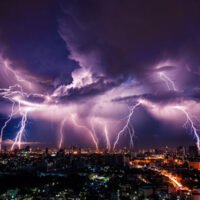Lightning Strikes And Personal Injury

Florida is sometimes referred to as the lightning capital of the U.S. due to its high frequency of thunderstorms, particularly during the summer months. While lightning strikes can be awe-inspiring, they are also extremely dangerous.
In fact, while every state has storms, Florida has more lightning-related injuries and deaths than any other state in the nation. Lightning injuries are tragic and often unexpected, but knowing your rights and comprehending the property owner’s responsibilities can help you seek justice. Talk to Miami personal injury lawyer to access legal support if negligence played a role in your injury.
The Risk of Lightning Strikes in Florida
The sheer volume of lightning storms in Florida significantly raises the chances of a lightning strike affecting individuals or properties. On average, lightning strikes the ground in Florida over a million times each year. This presents a heightened risk to people who are often outdoors for recreational activities, work, or even daily errands. The state’s humid climate creates the perfect conditions for these powerful electrical storms, often catching people off guard.
While some lightning injuries are unavoidable accidents, there are situations where property owners have a responsibility to implement safety measures. This duty of care is particularly relevant for locations where people gather in large numbers, such as beaches, parks, outdoor sports facilities, and amusement parks.
Property Owner Responsibility and Personal Injury Claims
In some cases, property owners can be held liable if a lightning injury occurs due to their negligence. Under Florida premises liability law, property owners have a duty to maintain safe premises for visitors. This includes implementing reasonable safety measures to protect guests from natural hazards, such as lightning strikes, when feasible. Examples of precautions include installing lightning rods, grounding structures, and providing adequate warning systems to inform people of impending storms.
When a property owner fails to install or maintain such safety measures, they may be considered negligent if a person is injured on their property as a result. For instance, an amusement park or sports complex that doesn’t have proper lightning safety protocols in place could face liability if a guest is injured by a strike. If negligence can be established, the victim may be entitled to compensation for their medical expenses, pain and suffering, and other related costs.
If you or a loved one has been injured by a lightning strike on someone else’s property in Florida, consulting with a Miami personal injury lawyer is a critical first step. An experienced attorney can investigate the circumstances, determine if the property owner failed to implement necessary safety measures, and help build a strong case for compensation. Navigating personal injury claims can be challenging, but with professional guidance, you can work toward securing the compensation you need to move forward.
Are you in need of financial relief as you struggle to recover from a lightning-related event? Share the specifics of your situation with the legal team at Spencer Morgan Law. Attorneys are available to determine if another can be held accountable. Book a confidential consultation today, call 305-423-3800.
